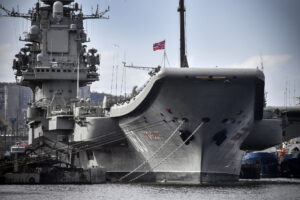UWA Defence and Security Institute’s Masterclass Series AUKUS: Pillar 1 provided an illuminating insight into what some of our brightest and best think about national security and how to achieve it. The net effect was profoundly depressing and unsettling.
The AUKUS agreement has some powerful and ardent admirers. I have never shared a room with quite so many admirals, consuls, commissioners, directors, heads of department, current and former political leaders, or experts in strategy and military technology. Being a sceptical minority of one in such company is not for the faint-hearted.
It is also not for the poor either, although I suspect I was the only person in attendance who used their own money for the privilege of attending. The $2,000 fee was clearly arrived at with a corporate audience in mind. Unsurprisingly, therefore, in addition to earnest discussions of security, grand strategy and the ubiquitous ‘China threat’, the other key theme was the business opportunities the AUKUS initiative presented for Western Australia.
Because the event was conducted under Chatham House rules, I’m not at liberty divulge who said what, but readers may be able to connect some dots by perusing the publicly available guest list. Suffice to say there was much talk about ‘great national objectives’ and ‘making the nation proud’ as we collectively respond to our ‘changed strategic circumstances’.
In this context we remain what the late Des Ball famously described as a ‘suitable piece of real estate’. The need for the ‘dispersal’ of strategic assets makes Australia a ‘brilliant’ option and a ‘permanently critical asset’ for the United States as it seeks to respond to the challenge of China. The three AUKUS partners are united by their ‘shared values’, we were assured, not the least of which is the joint commitment to the fabled ‘free and open Indo-Pacific’.
Whether the return of the Anglosphere and British gunboats in the ‘Far East’ is quite what the world needs at this fraught historical juncture was not discussed, but it was recognised that a bit of ‘diplomatic uplift’ might be required to convince the doubters. Indeed, selling the benefits of the deal, even generating excitement about it, was something nearly everyone thought was essential.
Much was made of the idea that Australia could not be a ‘strategic bystander’. Rather, Australia must ‘accept its responsibilities’ and develop a ‘credible deterrence’. The most consequential part of this duty, of course, was firstly the maintenance of American and British nuclear-powered submarines, and eventually the possible manufacture of our very own.
For this to happen the consensus was that we needed to ‘upskill’ the workforce and develop a ‘pipeline’ of graduates and even schoolchildren excited about the prospect of making weapons of mass destruction for a living. Universities like UWA would be at the forefront of this process and should ‘lean in, ‘get on with the job’ and take advantage of this ‘great opportunity’. Thousands of skilled jobs are promised, a process facilitated by equal numbers of scholarships and universities that teach the ‘right things’.
In my experience, UWA and many other universities will need little encouragement to align themselves with the interests and needs of the defence sector. Indeed, the very existence of the DSI demonstrates just how enthusiastically UWA is positioning itself to join the AUKUS gravy train. Whether this is actually the sort of role a university should play in an open society was another issue that was not canvassed by the participants.
In my capacity as the token heretic, I drew attention to the dangers of group think as evidenced by Vietnam and Iraq; the arms race and failure of deterrence before World War 1; the increased significance of HMAS Stirling as a nuclear target; the failure to address climate change as the most tangible and immediate security threat Australia faces, and the need for the US and China to actually cooperate at unprecedented scale and speed if the world is to avoid environmental collapse. All of which went down like a punctured Chinese weather balloon.
Several presenters mentioned their obviously much-loved children during the discussions. I was particularly struck by this as I find myself in the incongruous position of being both childless and yet apparently more concerned about the future of their offspring than they are. I thought better of pointing this out, but it remains a telling example of our ability to compartmentalise issues to overcome what would otherwise surely be disorienting cognitive dissonance.
For those of us without this enviable ability, the experience was profoundly depressing. I gave the networking opportunities (and the free food and drink) a swerve as I’d heard more than enough about this ‘fabulous innovative transition’ to be going on with. Clearly the state’s movers and shakers hadn’t though.
No doubt their children will be thrilled to learn about their parents’ role in preparing us for World War Three and opening up exciting career opportunities in the ‘defence ecosystem’ in the process. At least it will take their minds of the imminent demise of the natural variety.
Source : johnmenadue.com










